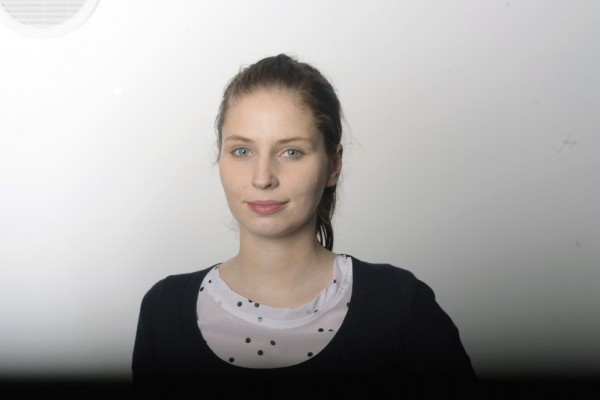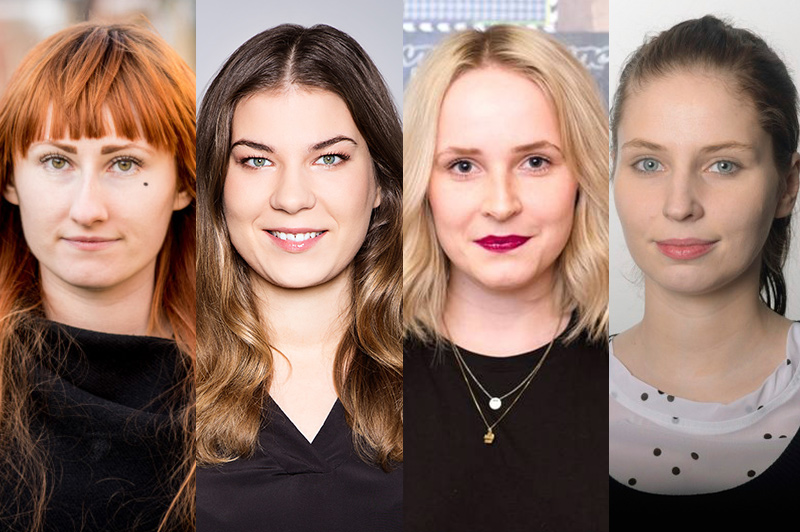Lesen Sie diesen Artikel auf Deutsch
Women experience online abuse differently – and to a different degree. The same goes for female journalists. As part of the International Press Institute (IPI)’s OnTheLine programme, we met five young women who work as journalists in Austria and spoke to them about their experience with online comments and postings that go beyond content-based criticism.
The journalists who shared their views with us are: Verena Bogner (Broadly, Vice News’ women’s interest news site), Teresa Havlicek (Wienerin, a women’s lifestyle magazine), Solmaz Khorsand (the daily Wiener Zeitung), Oona Kroisleitner (the daily Der Standard) and freelancer Olja Alvir.
Two conclusions formed a common thread through all of our conversations: first, the abuse is extraordinarily invasive, particularly when it reaches journalists unfiltered via social media; and second, the quantity and nature of the abuse depends strongly on the issue being covered. All of the journalists we interviewed stated that they could tell in advance whether an article would be particularly controversial and give rise to a large number of comments and postings.
Two issues in particular are said to trigger intense responses from readers: refugees and feminism. Or, as Bogner puts it, anything that is “about women and where a woman dares to make use of her right to have an opinion”.
Links between refugee issues and feminist-related topics are seen as particularly sensitive. Reporting on discrimination against women, or even simply stating that phenomena such as forced migration impacts women differently, provokes strong emotions. The journalists we interviewed said the intensity of these emotional responses had grown during the refugee crisis and the Austrian presidential election campaign.

Different media, different modes
The nature of the abuse varies according to the medium and the audience. In reader letters or in the forums on Derstandard.at, the online edition of the daily Der Standard, the abuse takes on a personal quality, but comments forego swear words or threats.
“Readers will ask whether I’m a spoiled brat, and if that’s the reason I engage with such problems,” Kroisleitner observes.
Or the comments employ codes. Feminists are quickly accused of being “frustrated”, which is usually a reference to sexual frustration. The women we interviewed also reported that certain readers continually make reference to their (presumed or real) immigrant background or to other things from their past that, in these readers’ view, prevent them from reporting objectively on a certain issue.
The degree of abuse is also said to depend on readers’ knowledge about the author. If a photo next to an article shows that the author is a young woman, the comments are different and head quickly in the direction “bimbo” or “little girl”.
But on social media such as Twitter and Facebook, users hold little back.
“I sometimes get the feeling that Facebook users are egging one another on,” Bogner says.
Here, the spectrum of abuse ranges from denying the journalist’s competence or criticising her appearance, all the way to “Go die, you whore”.
Implied threats such as “You should be raped by a refugee” commonly follow coverage of refugee issues, as do comments suggesting that women will “get what comes to them”. Implied threats that make use of the conditional are particularly difficult to deal with because they often do not disappear from social media, even after being reported.

Impact of ‘new audiences’
Comments or postings in response to issues such as refugees and right-wing politics become especially intense when the articles in question acquire a reach beyond their usual audience or are highlighted in forums or media outlets that belong to the right-wing scene. The website Unzensuriert.at (“Uncensored”), which is considered close to the far-right Austrian Freedom Party (FPÖ) party, is frequently mentioned in this context.
When Wienerin covered FPÖ presidential candidate Norbert Hofer’s position on abortion, Unzensuriert wrote an article with the title “Hysterical women’s magazine launches counterattack on Hofer”.
“A huge wave of abused followed,” Havlicek recounts. “Especially from men that otherwise never take part in discussion under our articles.”
Alvir, too, points to numerous cases in which Unzensuriert wrote about her, which raised the quantity of abuse enormously over the short term.

Always in the background
The abuse is perceived to be especially invasive in the periods after a particularly critical article appears, and becomes even more so when the possibility of avoiding the abuse is limited. This is the case, for example, when the abuse comes via private message or Twitter, or when the newsroom and the community engagement department are not separated, meaning that journalists are forced to read all of the comments on their article or on those of their colleagues. In addition, the journalists perceive attacks on the subjects of stories as attacks on themselves.
The journalists we interviewed say that the online abuse has no direct impact on the choice of topics covered or the coverage itself, at least not in the sense of self-censorship. What emerges instead is a kind of “now more than ever” attitude: the intense comments are taken as proof that it was right to cover the issue in question.
At the same time, the women say, it is difficult to pinpoint possible unconscious self-limitations that may arise.
“The user comments are always there with you in the background,” Havlicek reflects. “So you at least think for a lot longer about certain phrasings.”

Dealing with the challenge
Among the journalists we interviewed, there are differences not only in terms of how strongly the abuse is felt, but also in terms of the mechanisms used to deal with it.
“There is no ‘right way’ to deal with abuse,” Alvir says.
The women agree that it is not possible to give advice that works in every situation, not only because each person is different, but also because each incidence of online outrage has its own dynamic.
All of them say the first people to whom they turn are colleagues, especially those who have suffered similar problems. Dealing openly with the issue in the newsroom can help keep the abuse from getting to one too much, they suggest.
They frequently highlight as a positive the possibility to avoid engaging with the extreme negative reactions to one’s own work. In the analogue world, secretaries and management departments filter out the worst of readers’ letters. Similar possibilities can be found in the digital world. At derstandard.at, journalists have the possibility to read postings (including those that haven’t even been published), but aren’t required to do so.
One problem, the women say, is that although there are mechanisms to shield journalists from abuse in advance – which vary according to the size of the media outlet and its understanding of the problem – there is usually no central contact point that communicates openly and acts as a switchboard in case there are problems with online abuse.
Several of the journalists we interviewed have had good experiences with confronting the abuse on their own. They publish screenshots of particularly extreme instances of abuse on their private profiles, both to raise awareness of the problem and to get rid of a certain emotional burden.
“There’s a certain relief there,” Bogner explains. “I wouldn’t call it gratifying, but it does leave you feeling somewhat satisfied.”
Alvir, too, says that she previously made her audience aware of particularly bad abuse on Twitter and called for it to be reported.
The journalists see small gestures of solidarity and encouragement positively, regardless of whether they are expressed on the journalist’s profile or underneath an article.
Notably, many of the women have limited their presence on social media in various ways. Olja Alvir hasn’t had a private Facebook profile in years and has changed her settings on Twitter so that she only sees comments from people whom she also follows.
“At some point it became too much for me,” she says. “I didn’t want the toxic influence on my everyday life anymore.”
Teresa Havlicek consciously stays away to a large extent from Twitter and Oona Kroisleitner has changed her Facebook settings so that fewer and fewer postings reach her from people who are not her friends.
These measures are partly seen as self-empowerment, but they have the disadvantage that certain voices in parts of the debate either aren’t heard anymore, or are heard more quietly.
Translated from the German by Scott Griffen.
[separator style_type=”none” top_margin=”15″ bottom_margin=”20″ sep_color=”#eae9e9″ border_size=”” icon=”” icon_circle=”no” icon_circle_color=”#ffffff” width=”” alignment=”center” class=”” id=””]
[content_boxes layout=”clean-horizontal” columns=”1″ icon_align=”left” title_size=”18″ backgroundcolor=”#d5cb0b” icon_circle=”” icon_circle_radius=”” iconcolor=”#d5cb0b” circlecolor=”#d5cb0b” circlebordercolor=”#d5cb0b” circlebordercolorsize=”” outercirclebordercolor=”#d5cb0b” outercirclebordercolorsize=”” icon_size=”” link_type=”” link_area=”” animation_delay=”” animation_offset=”” animation_type=”0″ animation_direction=”down” animation_speed=”0.1″ margin_top=”0″ margin_bottom=”0″ class=”” id=””]
[content_box title=”On</the>line: Tracking online threats against journalists” icon=”” backgroundcolor=”#d5cb0b” iconcolor=”#000000″ circlecolor=”#d5cb0b” circlebordercolor=”” circlebordercolorsize=”” outercirclebordercolor=”” outercirclebordercolorsize=”” iconrotate=”” iconspin=”no” image=”” image_width=”35″ image_height=”35″ link=”” linktarget=”_self” linktext=”” animation_type=”0″ animation_direction=”down” animation_speed=”0.1″]
![]() This article is part of IPI’s digital media initiative, OnTheLine, which tracks online harassment of journalists and independent news websites.
This article is part of IPI’s digital media initiative, OnTheLine, which tracks online harassment of journalists and independent news websites.
[/content_box]
[/content_boxes]
